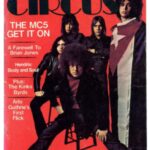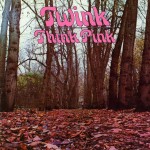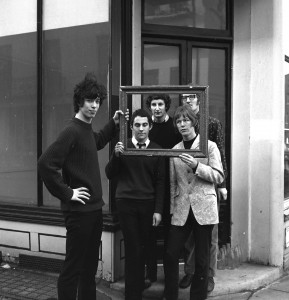-
Featured News
The MC5: A Eulogy
 By Doug Sheppard
And then there were none. Five equals zero. The morning of May 9, 2024, the last surviving member of the MC5, drummer Dennis Thompson, died while recovering from a heart attack—
By Doug Sheppard
And then there were none. Five equals zero. The morning of May 9, 2024, the last surviving member of the MC5, drummer Dennis Thompson, died while recovering from a heart attack— -
Featured Articles
The Beatles: Their Hollywood and Los Angeles Connection
 By Harvey Kubernik
JUST RELEASED are two new installments of the Beatles’ recorded history, revised editions of two compilation albums often seen as the definitive introduction to their work.
Or
By Harvey Kubernik
JUST RELEASED are two new installments of the Beatles’ recorded history, revised editions of two compilation albums often seen as the definitive introduction to their work.
Or -
The Making of Think Pink

An Interview with John “Twink” Alder by Augustus Payne
Could you tell me about the events leading up to the recording of the Think Pink. It was nearing the end of your tenure with the Pretty Things, correct?
I was playing drums for the Pretty Things and at that time, early to mid ’69, I and other members of the Pretties, had been hanging out with Steve Peregrin Took and members of the Deviants. We had performed a number of shows together and would often go out partying afterwards. I became very interested in the Deviants community spirit and began to attend their recording sessions (the last album) and photo sessions, etc.
In June ‘69 Mick Farren invited me to meet Seymour Stein and Richard Gottehrer of Sire Records, a US record label who had released the Tomorrow album in the States (the band I was in before the Pretties). We met and a deal was struck there and then for album from Twink with Mick Farren as producer. The album was recorded in July 1969 and at the end of the month my last show with the Pretty Things was at the Isle of Wight Festival (Bob Dylan also played). There was still some work to be done on Think Pink, i.e. mixing, which was done with Steve Peregrin Took and Richard Gottehrer in attendance, after I returned from a two-week holiday in Portugal in August or September.
The Attack: An Interview with Richard Shirman
By Mike Stax
Inhabiting a region of the sonic solar system somewhere between the Creation and the Small Faces, the Attack languished in comparative obscurity back in their day, only to be recognized decades later as one of the most exciting bands of the era.
That none of the band’s four singles for Decca cracked the charts was more down to bad luck and record company incompetence than any shortcomings on the band’s part. Their first effort, in January 1967, was a sharp version of the Ohio Express/Standells nugget “Try It,” backed with the great, Hammond-drenched mover “We Don’t Know.” Composed by singer Richard Shirman and lead guitarist Davy O’List, the song was nominally based on an obscure soul single, Mona Lisa’s “They Don’t Know,” with new, sarcastic social comment lyrics, including the opening salvo: “We don’t know about the H-Bomb / We don’t know about drugs / We don’t know what is going on / They say that we are thugs.”

The Attack, 1967. L to R: Richard Shirman, Barney Barnfield, Davy O’List, Gerry Henderson, Bob Hodges (glasses). (Photo courtesy Phil Smee)
While “Try It” failed to click with the record buying public, the band felt they were onto a sure thing with their next release, “Hi Ho Silver Lining,” but they were beaten to the bunch by Jeff Beck who romped into the charts with his Mickie Most-produced version after the Attack’s record was delayed at the pressing plant. The B-side was a cracker too. Based on a blistering guitar hook by O’List, “Any More Than I Do” was the Attack at their most incendiary, and still thrills every time. Totally disillusioned by the failure of “Hi Ho Silver Lining,” this lineup folded shortly afterwards, with O’List going on to the Nice.
The Monks – Monk Time

This article was the cover story of Issue #11 of UGLY THINGS in the spring of 1992. At this point in time, only two of the original Monks had been located. In the years that followed there would be a book (Eddie Shaw’s Black Monk Time), reunion concerts, an award-winning documentary (Transatlantic Feedback, directed by Dietmar Post and Lucia Palacios), tribute albums, and numerous reissues. But UGLY THINGS got there first.
I’d like to dedicate this article to the memories of Dave Day Havlicek and Roger Johnston.
MONKS STORY by Mike Stax / INTERVIEWS by Keith Patterson and Mike Stax
The music of the Monks is the stuff of true greatness: huge chunks of reverberating bass and drum rhythms, beaten into further frenzied overdrive by the atonal gash of an electrified banjo; this overlaid with the rapid-fire piercing squeals of delirious organ wailings and the hum and howl of fuzz and feedback as some maniac jaggedly assaults an electric guitar; this all pushing forward the angst-driven, aggressive voices shouting: “I hate you baby with a passion…” “People go to their deaths for you…” “Boys are boys and girls are joys…” “Pussy galore is coming down and we like it… we don’t like the atomic bomb…” “Shut up! Don’t cry!” and “Higgle-Dy Piggle-Dy—let’s do it!”